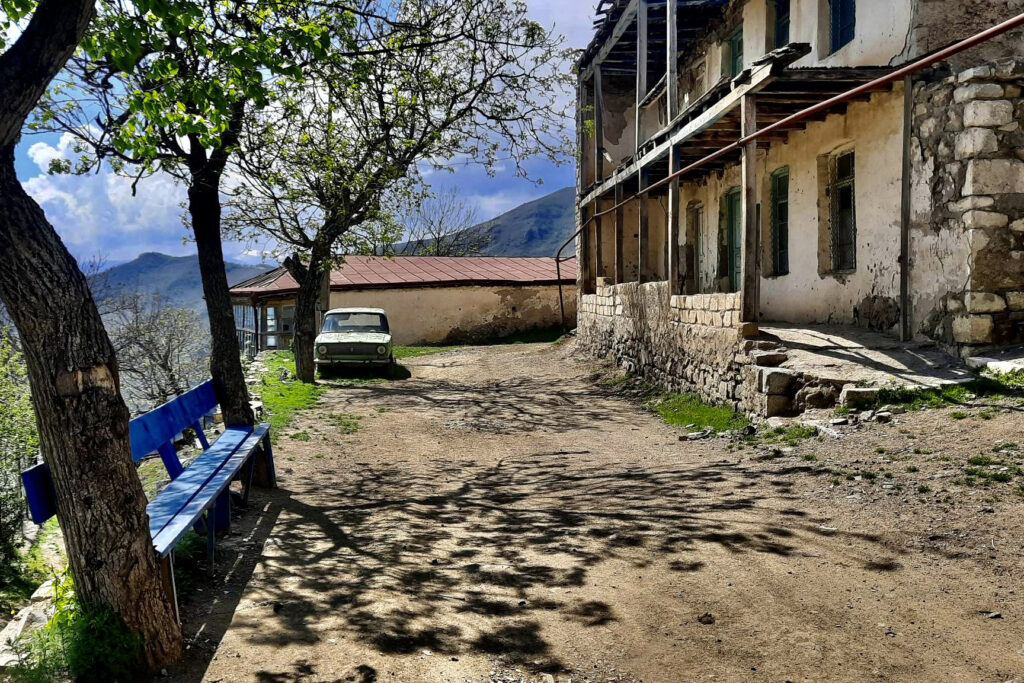With ‘eco-activists’ blocking one side and an Azerbaijani checkpoint on the other, four Armenian villages in the Lachin Corridor have found themselves cut off from all directions.
‘The Red Cross vehicles are seen passing, the Russians are seen passing, but no one stops here’, says Samvel Tavadyan, a teacher in the village of Mets Shen.
Mets Shen lies on the new route of the Lachin Corridor. The road, the only one in and out of the region, was supposed to be controlled by the Russian peacekeeping mission following the end of the Second Nagorno-Karabakh War in November 2020.

The village, along with three others in the Shusha (Shushi) region of Nagorno-Karabakh, has been cut off from the rest of the region since mide-December, when Azerbaijanis claiming to be ‘eco-activists’ blocked the road near the capital Stepanakert, allowing through only vehicles from the Russian peacekeepers and the Red Cross.
[Read on OC Media: Opinion | Greenwashing a blockade]
On 23 April, their situation became more difficult still, when Azerbaijani border guards installed a checkpoint at the other end of the Lachin Corridor, on the border with Armenia.
Tavadyan describes the situation as ‘terrible’.

‘We survive with what we have at the moment, what is in the houses, what we managed to buy in time, but it will be enough for a week or two’, Tavadyan tells OC Media. ‘Then?’
Mets Shen and three other nearby villages have a total of around four hundred residents, mostly elderly people, Tavadyan says. The school he teaches in has only nine pupils.
While the villages lie close by, even the connections between them is now at risk, as the fuel is running out.
‘Before, we were surrounded on three sides, now — four’, Tavadyan says. ‘It feels like a cage’.

The only vehicles allowed to enter Nagorno-Karabakh belong to the Red Cross and the Russian peacekeeping forces, with the Red Cross supplying the region with medication and facilitating the transfer of those in urgent need to the hospitals in Armenia.
But following the installation of the checkpoint last week, access to the region became harder, with Stepanakert announcing over three dozen patients not being able to go to Armenian hospitals.
According to local authorities, the humanitarian aid sent through Russians was also suspended and then partially resumed, when peacekeeper vehicles began entering the region again after 26 April.
While Mets Shen is around an hour’s drive from both Stepanakert and Goris, in Armenia, residents more often went to Goris.
‘It was more convenient, and the goods are cheaper there’, Tavadyan says.
Davit Davtyan, the Mayor of Mets Shen says there is only one difference between their situation and that of the rest of Nagorno-Karabakh — ‘we are surrounded on both sides’.
Davtyan says the people still have food, but that the situation is different in different families — those with livestock or who stockpiled supplies are good, but others are in a more difficult position.

The shops are no longer working in the villages.
‘We were bringing food from Goris, and we had only one road. Now it’s closed’, he says.
According to Samvel Tavadyan, the shopkeeper had gone to Goris for new products right before the new checkpoint was erected. ‘He could not return with his car, he left the car there; the Russians brought him to the village with their vehicle’, he says.
But according to the Mayor, despite the shortages, ‘people try to help each other in whatever way they can; they share the daily bread among themselves’.
‘The medication problem is serious’, he says. ‘If someone gets sick, we won’t be able to provide the help they need’.
Despite peacekeeping vehicles passing through the village, local residents say they have not stopped to deliver supplies.
Samvel Tavadyan says the residents had previously hoped their villages, and the rest of Nagorno-Karabakh, might live normal lives at least for five years after the war, until the mandate of the Russian peacekeepers was due to end or be renewed.
‘People hoped that Russians would ensure free movement’, he laments, now confined to a small area between the blockade and the new checkpoint.
‘The most dangerous thing is that everything changes very unpredictably and quickly’, he says.
For ease of reading, we choose not to use qualifiers such as ‘de facto’, ‘unrecognised’, or ‘partially recognised’ when discussing institutions or political positions within Abkhazia, Nagorno-Karabakh, and South Ossetia. This does not imply a position on their status.




 28 April 2023
28 April 2023





